“Blessed are the poor in spirit, for theirs is the kingdom of heaven.”
-Matthew 5:3
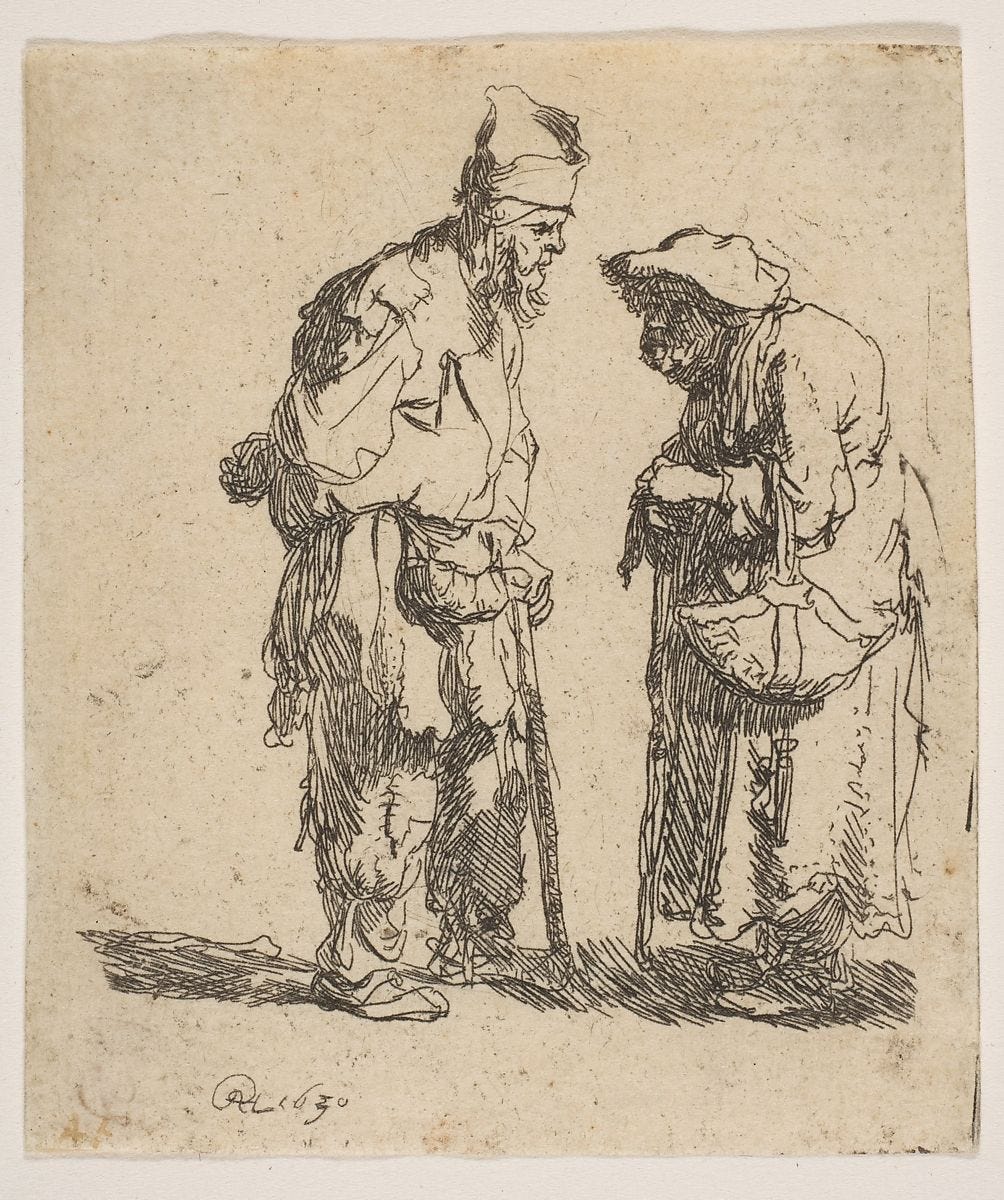
Rembrandt. Beggar Man and Beggar Woman Conversing. 1630, The Met, New York City.
Good evening friends!
Our main guide through the Beatitudes, Dale Frederick Bruner, writes, “the Son of God simply blesses broken people. The Beatitudes must first be heard as grace, or they will not be heard correctly” (156). About Jesus, he writes, “He blesses before he commands, he helps before he orders” (157) and “Jesus’ Beatitudes bless persons not because of their virtues but because of their inadequacies” (163). For Bruner and for Matthew, it seems you are blessed not because you are a virtuous human—paying all your taxes and donating to charity and never cussing—no, you are blessed because you are hurting, and this blessing is Christ beside you, recognizing your pain.
These are hard truths for me. As I wrote this reflection, I wanted to make it tied to virtuous merit or a good attitude. Blessed are you for being cheerful despite being poor! Blessed are you for doing all the right things even though you’re tempted not to! Blessed are you for being a good person when the world could easily turn you bad! But when you look at the Beatitudes you notice, as Bruner said above, that Jesus leads with blessings and doesn’t attach strings. He simply provides the statement of blessing to people in desperate situations.
And we have all been in desperate situations. Whether it is addiction or anxiety, pain or loss, fear or abuse—we are each desperate in one way or another. And even before we turn to God for help, the Beatitudes tell us God is with us. It is not a blessing to be poor in spirit or in pain. No, but Jesus tells us that he is with us in our pain, and, therefore, we are being blessed.
I hope today’s reflection means something to you.
cheering for you,
drew
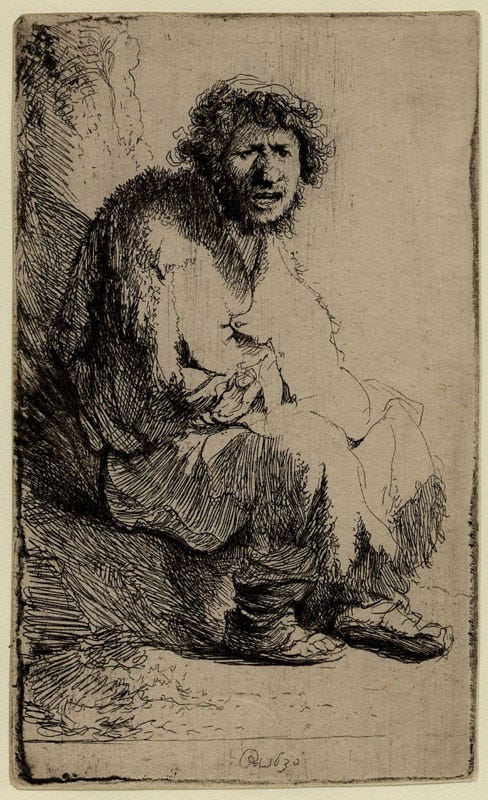
Rembrandt. Beggar Seated on a Bank. 1630, British Museum, London.
And they came to Jericho. And as [Jesus] was leaving Jericho with his disciples and a great crowd, Bartimaeus, a blind beggar, the son of Timaeus, was sitting by the roadside. And when he heard that it was Jesus of Nazareth, he began to cry out and say, “Jesus, Son of David, have mercy on me!” And many rebuked him, telling him to be silent. (Mark 10:46-47)
Bartimaeus, the blind beggar, is sitting too far away. Most days he is put up with, but not today, not when everyone is on their best behavior for the Miracle-worker in their midst.
Bartimaeus is too desperate, crying out to Jesus like that. All the important people know to place their requests in the comment sections of questionnaires or prayer request tear-offs of bulletins. There are appropriate times to let requests and needs be known, and in the middle of the street as Jesus is walking by is not an appropriate time.
He is not worthy of Jesus’s time—too uncivilized, too unschooled in sophistication, too desperate.
But [Bartimaeus] cried out all the more, “Son of David, have mercy on me!” And Jesus stopped and said, “Call him.” And they called the blind man, saying to him, “Take heart. Get up; he is calling you.” (Mark 10:48-49)
It’s not the people on their feet who gain Jesus’s attention. It isn’t the fit or the worthy or the socially acceptable. No.
Jesus calls Bartimaeus over, and the crowd splits like the Red Sea. Bartimaeus, as overlooked as shrubbery on the side of the road, walks to Jesus as a man blessed. It isn’t until Jesus calls him that the crowd even recognizes him—only Jesus sees him for what he is, and because of Jesus he is now a bush on fire, attracting a crowd of admirers.
And throwing off his cloak, he sprang up and came to Jesus. And Jesus said to him, “What do you want me to do for you?” And the blind man said to him, “Rabbi, let me recover my sight.” And Jesus said to him, “Go your way; your faith has made you well.” And immediately he recovered his sight and followed him on the way. (Mark 10:50-52)
Bartimaeus called to Jesus but was silenced. He saw Jesus but was ignored.
But he kept calling.
And Jesus saw Bartimaeus, and Jesus called Bartimaeus. Jesus made Bartimaeus well because of his faith.
With Jesus’s words, Bartimaeus was blessed. Jesus, the man who held the Kingdom in his hand, welcomed Bartimaeus into it.
Blessed are those who are desperate.

Rembrandt. Beggar Leaning on a Stick, Facing Left. 1630, The Met, New York City.
Earth’s crammed with heaven,
And every common bush afire with God;
But only he who sees, takes off his shoes,
The rest sit round it and pluck blackberries.
-Elizabeth Barrett Browning (“Aurora Leigh”)
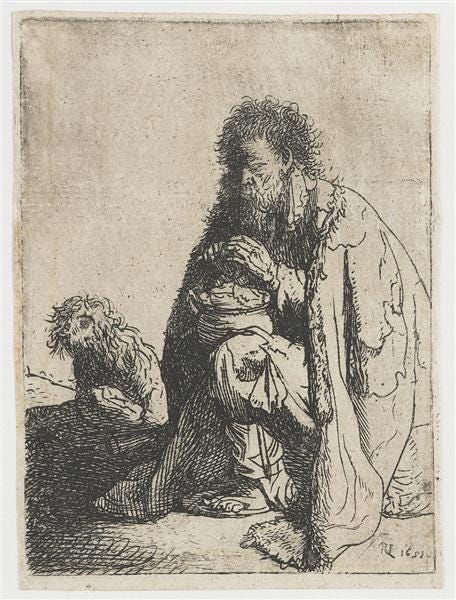
Rembrandt. Seated Beggar with His Dog. 1629, The Morgan Library and Museum, New York City.
“For all such desperate persons, for all those whom the world calls ‘failures,’ God is especially there.”
-Dale Frederick Bruner, Matthew: A Commentary, 160
Blessed are those who are poor in spirit.
Blessed are those who sit in psychiatrists’ offices, and blessed are those who are about to sit in psychiatrists’ offices. Blessed are those who spend mornings putting on faces to hide what’s underneath. Blessed are those who are broken up with and cheated on and hurt, and blessed are they when they escape but feel cold and empty and ashamed. Blessed are those who keep the lights on in government housing, and blessed are those who endure taunts of being Welfare Queens by people with no imaginations. Blessed are those praying it is benign, and blessed are those whose fears are metastasizing. Blessed are those who said it wouldn’t get to this and blessed are those who have gotten there but can’t find joy. And blessed are those no one sees; the misunderstood, the miseducated, the missing.
Your blessing is not dependent upon the last time you showered or the amount of your last paycheck. It is not tit for tat, nor is it waiting on you to unlock a secret code. It comes with no pay offs or in-app purchases, and it has zero patience for your polite deference.
Blessed are you who are poor in spirit, who are desperate and cry out for Jesus and discover he is sitting beside you, for yours is the kingdom of heaven.
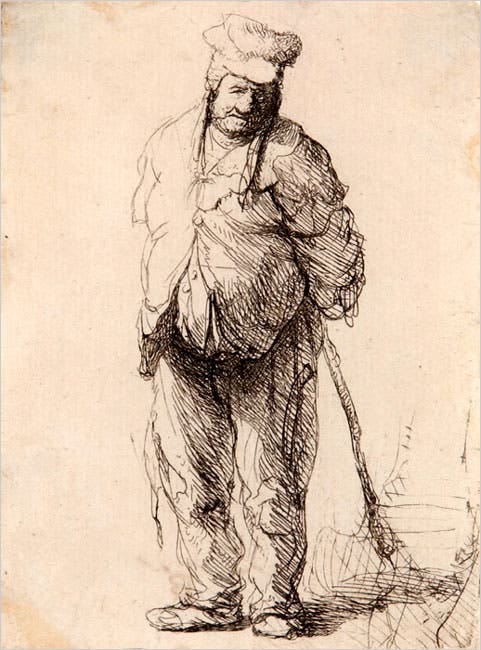
Rembrandt. Ragged Peasant With His Hands Behind His Back. 1632, Morris Museum, New York City.
I don’t know what your life situation looks like or how you are doing, but some times are harder than others. If you are experiencing an especially hard time and need someone to speak with, To Write Love On Her Arms has an excellent list of resources to speak with someone anytime, day or night.
There are people who care deeply for you!
I hope your week is excellent.
cheering,
drew
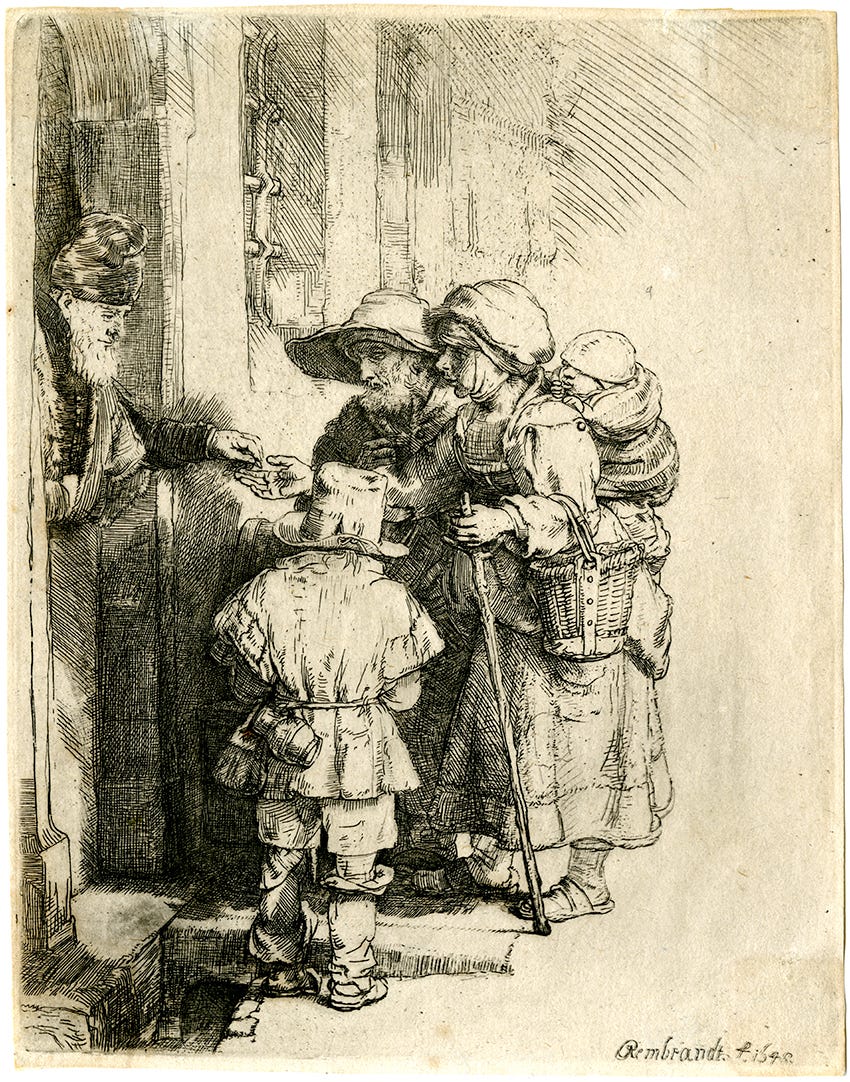
Rembrandt. Beggars Receiving Alms At The Door Of A House. 1648, Master Works Fine Art.


